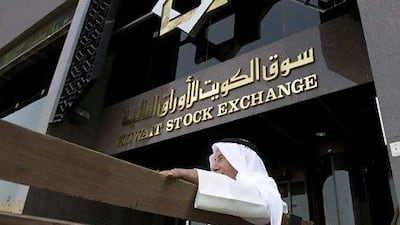Kuwait’s inclusion in the FTSE Russell Emerging Markets Index on Monday is expected to attract $1 billion (Dh2.6bn) of passive inflows to its capital markets, boosting liquidity and placing the country firmly on the map for foreign investors.
“This is another important watershed moment [after Saudi Arabia’s inclusion in the MSCI emerging market index in June] and a positive step for the region’s transition into mainstream emerging market investment,” said Salah Shamma, head of Mena investment at Franklin Templeton emerging markets equity.
“Capital market developments like this make the region difficult to bypass from an investor point of view.”
Kuwaiti stocks entering the index will be given 50 per cent of their weightings this month and the remaining 50 per cent in December, FTSE Russell said. Kuwait will have a 0.51 per cent weighting in the index. A total of 12 companies joined the benchmark on Monday, including National Bank of Kuwait, Kuwait Finance House and Agility, among others. Since FTSE announced Kuwait's inclusion in March, stocks have outperformed their GCC peers, with net foreign flows to the country totalling $264 million compared to $147m to Saudi Arabia, according to Egyptian investment bank EFG Hermes.
“This highlights the increased interest in the Kuwaiti market, which offers a safe haven within a volatile emerging market backdrop,” Mr Shamma said. “We believe we have barely scratched the surface in terms of liquidity.”
Capital flows were further boosted by another index provider MSCI, which announced in June that it will upgrade Kuwait to emerging market status next year.
Boursa Kuwait, the $283bn stock exchange, is up more than 10 per cent so far this year on the anticipation of inclusion in the gauge.
The country was put on MSCI's watchlist in June and analysts said the country has met most of the criteria set by the index provider. The inclusion, which would be effective from May 2020 at the earliest, should result in another $2bn of passive inflows, analysts at Arqaam Capital and Franklin Templeton said.
Passive investors track indexes and do not pick stocks as opposed to active investors.
“Kuwait’s inclusion in mainstream EM indices like FTSE and, likely next year, MSCI, has been driving foreign inflows to the equity market since the autumn of 2017 and that process has several months left to run, which is positive for the market,” said Hasnain Malik, head of frontier markets strategy at Exotix.
The country has also overhauled its capital markets to attract more foreign inflows.
Important capital reforms that led to Kuwait’s inclusion in the FTSE list include the segmentation of stocks according to market capitalisation and liquidity in April, intended to incentivise improvement. More recently, Kuwait started the publication of foreign ownership data for Kuwaiti banks for the first time. This is required by index providers to assess foreign ownership limits.
Meanwhile, Boursa Kuwait is preparing for its own initial public offering in the first quarter of 2019.
Kuwait, Opec’s fifth largest oil producer, has the GCC’s oldest stock exchange and sovereign wealth fund.
________________
Read more:
Kuwait stock exchange starts second phase of revamp
Boursa Kuwait preparing for its IPO in first quarter of next year
Saudi Arabia left out of FTSE Russell emerging markets index, Kuwait upgraded
Kuwait vies to reposition itself as hub for business
________________
Yet the country has struggled to regain its status as the fastest growing regional economy of the 1980s following Saddam Hussein’s 1990 invasion, which curtailed modernisation of infrastructure for years. Parliamentary debate over policy has since hindered progress of much-needed reforms. Kuwait fell into deficit in 2015 for the first time since 1999, prompting the government to launch its Kuwait 2035 economic diversification strategy last January.
A report by Arqaam Capital this month described Kuwait as a “safe haven” with a “stable macro backdrop”. Kuwait is likely to register a fiscal surplus of 13.5 per cent of gross domestic product while liquidity remains “ample”.
“The Kuwaiti market has done well overall with the main index constituents, basically the larger companies, outperforming,” said Michael Malkoun, executive director of research at Arqaam Capital. A sell-off after implementation is likely, but would be “limited”, as phase two of the inclusion is scheduled for December, he added.
Kuwait’s economic fundamentals have not changed at all, increasing its appeal for investors, Mr Malik said. “High oil prices and a very strong sovereign balance sheet make for low risk, while the formation of a new government in Iraq should help those Kuwaiti companies with exposure.”

